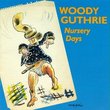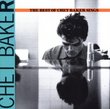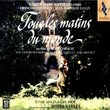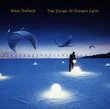| All Artists: Taylor, Seattle Symphony Chorale, Schwarz Title: Taylor: Peter Ibbetson Members Wishing: 0 Total Copies: 0 Label: Naxos American Original Release Date: 1/1/2009 Re-Release Date: 7/28/2009 Genre: Classical Styles: Opera & Classical Vocal, Symphonies Number of Discs: 2 SwapaCD Credits: 2 UPC: 730099901673 |
Search - Taylor, Seattle Symphony Chorale, Schwarz :: Taylor: Peter Ibbetson
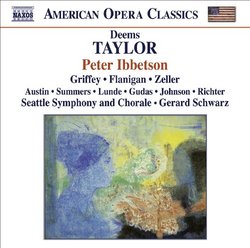 | Taylor, Seattle Symphony Chorale, Schwarz Taylor: Peter Ibbetson Genre: Classical From its triumphant, star-studded — première in 1931 until 1985, Peter — Ibbetson was the most-performed — American opera at the Metropolitan — Opera in New York. The story (based — on the novel by George Du Maurier) of — t... more » |
Larger Image |
CD DetailsSynopsis
Product Description From its triumphant, star-studded première in 1931 until 1985, Peter Ibbetson was the most-performed American opera at the Metropolitan Opera in New York. The story (based on the novel by George Du Maurier) of two star-crossed lovers who secretly escape to a mystical 'dream world' was immensely popular in the 1930s, and was the subject of several Hollywood films. Composer Deems Taylor known to millions as the host of the original Disney Fantasia movie was at that time a leading voice in American music. His lush, romantic/ impressionist music and masterful dramatic timing make Peter Ibbetson a most rewarding listening experience, and a 'must' for all opera fans. Rediscover an American classic with this world-première recording featuring some of today's leading opera stars. Similarly Requested CDs
|
CD ReviewsFor Those Who "Dream True," Unfortunately, Not QUITE a Dream Dace Gisclard | Houston, TX | 07/29/2009 (4 out of 5 stars) "Since the late 1950's, when I fell in love with Howard Hanson's LP of Deems Taylor's "Through the Looking-Glass," this composer has been a private crusade of mine. Nowadays Taylor is remembered as the narrator of Disney's "Fantasia," if he is remembered at all. A pity, because he wrote a good deal of appealing music in a Debussy/Wagner neo-impressionist idiom, which, if one likes it, is called "traditional", and if one has an axe to grind (as did the serialists), "behind the times." I'm of the former camp. Later, I found the "Unique Opera Recordings" LP's of "Peter Ibbetson" with the cast of the 1931 Met premiere. Again, despite terrible sound, it was love at first "sight". (NAXOS HISTORICAL has given us many valuable CD transfers of Met broadcasts--why not "Peter Ibbetson"?) Still later, I acquired a tape of the Chicago(?) Romantic Music Festival revival. The sound was an improvement, but the performance was of the "revised version" (published by Fischer), which involved some trimming of the "dream" sequences and the Peter/Mary duets. (The present recording seems to use this edition.) Since then, the Met broadcast has been briefly available as an "Immortal Performances" CD. The MET audiences of the 30's loved the piece. According to James Pegolotti's informative notes, "The opera received 22 performances over four seasons from 1931 to 1936, a record that held until 'Porgy and Bess' entered the Metropolitan repertory in 1985"--(He means for an American opera). Until now, I had despaired of there ever being a commercial recording in decent sound. Now, thanks to NAXOS, it is here at last, and, although the response the performance itself elicits from me is akin to W.S. Gilbert's "modified rapture," it's a welcome release. The libretto is based upon George duMaurier's novel. Peter, no longer able to contain his rage at the taunting of his guardian, Colonel Ibbetson (a pathological liar), that Peter is the "love child" of the Colonel and Peter's mother, unintentionally kills him. Although Peter is condemned to life imprisonment, he and his childhood sweetheart, "Mimsey," meet in their dreams, through their childhood game of "dreaming true." Taylor sets this extravagantly romantic story to an extravagantly neo-romantic (and very tonal) score, awash in Debussy and Wagner, with more than one nod toward the lush film music of its era. Other parts sound like the more dissonant passages of late Strauss. The opera is an orchestral tone-poem with the voices superimposed, in the manner of Debussy, Wagner, Strauss or Zandonai. If you caught Alagna's DVD of Alfano's "Cyrano" the procedure is similar, i.e., there are very few separate "set" pieces that can be excerpted. An exception is the Colonel's sweepingly melodious Act I aria, "Si vous croyez," which will probably now undergo a metamorphsis into a baritone warhorse similar to that undergone by Harlequin's "Dance Song" from Korngold's "Die Tote Stadt." For at least 35 years, I've been recommending both arias to baritones looking for fresh audition repertoire, only to be stared at as if I'd crawled out from under a rock. Now that there's an easily available commercial recording, the process will begin, and EVERY baritone will be singing the piece, thinking it's something new-ARRRRGH! (A completely unrelated aside--I find it a little odd that whenever Mimsey is mentioned, everyone's immediate first recollection of her is always, "poor little Mimsey--'toujours mal a la tete'"--WHAT was her problem?) Any present-day cast would have a hard time competing with the legendary performers of the premiere--Lucrezia Bori, Edward Johnson, Lawrence Tibbett, Gladys Swarthout--WOW! With one unfortunate exception, the Seattle Opera has cast most of the lead roles (and even the secondaries) with, at the very least, capable singers, and in many cases, better than that. In the lead role of Peter, Anthony Dean Griffey is the best of them, using his ringing lyric tenor to believable dramatic effect as the sensitive young dreamer. Pardon the mixed metaphor, but as the Colonel, baritone Richard Zeller has his hands full trying to fill Lawrence Tibbett's shoes. His singing is sweet-toned and consistent--if not distinctly memorable in timbre--but I would have wished for a darker and more mature-sounding voice for the elderly villain of the piece. In the relatively minor role of Mrs. Deane, Lori Summers' mezzo is pleasantly rich, and she is believable as the sympathetic shoulder Peter cries on. The weak link, unfortunately, is Lauren Flanigan in the other lead role of Mary (the Duchess of Towers, aka "Mimsey"). Her voice is pretty enough, but her mannerism of crooning into the tops of phrases often makes them almost a half-tone flat. This occurs frequently enough to be annoying. The listener must resort to a great deal of second-guessing in order to reconstruct in the mind's ear the pitches she should actually be singing. As I expected from his CD of "Through the Looking-Glass," conductor Gerard Schwarz has a tendency to allow point-to-point momentum to sag. This has nothing to do with an objection to "expressive lingering" on my part (it is de rigeur in this sort of music), or whether or not I find his tempi too slow. He's inconsistent about pointing phrases to and from their destinations--merely traveling does not describe a point of arrival. Sometimes his rubato is flexible and expressive--at other times he is maddeningly literal (as in the opening of Act I). Let it be said, however, that the Seattle Symphony is a superb orchestra--NAXOS affords them lush yet transparent (if somewhat back-balanced) recording. The result is a revelation after struggling for years to hear the Met broadcast through a veil of noise. Hearing the details clearly at last!--that alone is worth the price of these budget-priced discs. Chorus master Abraham Kaplan's painstaking work shows off to advantage in the "dream sequences." These are among the loveliest portions of the score. Some portions recall the sort of music that accompanied "flashback" sequences in the motion pictures of the period. Others are based on the French folk-tunes Gogo (Peter) heard during his childhood in France. At last, we can hear these interludes without being forced to listen through the descriptive voice-overs of the Met broadcast! For the portions of the story set in France, the libretto goes narcissistically bilingual. NAXOS very generously supplies a complete English/French libretto on its website. This opera is like a classic romantic costume drama movie from the 1930's or 40's. It's an immensely lovable work, despite (or perhaps because of) its clinging to European culture for support, typical of American "high art" products of its age. Notwithstanding disappointments about some aspects of the performance (hence the four stars), it IS a dream come true to hear the details of this lovely score unimpeded by the noise and poor recording of the Met broadcast. No cry-happy sentimentalist should miss this! Doubtless, it will be a long time before we get a better (or even another) recording of "Peter Ibbetson"--if we EVER do." A Major 20th Century American Opera-The Gap Finally Filled Jerrold Fink | 09/14/2009 (5 out of 5 stars) "A MAJOR 20th CENTURY AMERICAN OPERA - THE GAP FINALLY FILLED Review by Jerry Fink Deems Taylor was a major American music critic and composer best remembered for two operas, The King's Henchman and Peter Ibbetson ; and, his "live" appearance in the Disney feature film Fantasia . Peter Ibbetson has been considered one of the signature operas of the American "traditionalist" school of the 1920's and 30's. The work was commissioned by Gatti-Casazza for the Metropolitan Opera and premiered February 1931. It was a box-office success and ran between 1931 and 1936 giving the Met a needed financial "shot in the arm" in the bowels of the Depression. The plot of the opera was taken from George Du Maurier's novel of the same name. The timeline of the story is roughly a thirty year period between 1855 and 1887. The action takes place in both England and France with most of the French scenes sung in French and the English scenes sung in English. Peter and Mary are the adult counterparts of two children ( Gogo and Mimsey ) who grew up as children in France as very good and trusted friends . As the plot continues, their adult relationship with each other becomes more defined and, of course, more complicated. Since Mary is married, Peter will not be able to fulfill his desire for a complete relationship with the woman he loves. His relationship with his Uncle has been and continues to be unbearable. When Peter finds out that his Uncle has told others that he is really Peter's father, Peter`s anger culminates in killing his Uncle. Peter ends up in prison, with his death sentence commuted to life in prison. Peter's only solace in life is reflected in two large dream scenes (one each in acts two and three). His love for Mary can only be totally fulfilled when he dreams "true". Thirty years pass. Peter is informed by his old and dear friend Mrs. Deane that Mary has passed away. As Peter lies dying, Mary appears as a spirit beckoning Peter to come with her. He dies and the opera ends with a chorus greeting a new and more beautiful day. The sound of Taylor's music is quite beautiful throughout. The orchestra is the main protagonist and plays continuously. The vocal writing is mainly declamatory with a few important arias and ensembles sprinkled appropriately throughout the work. Wagner, Massenet, Debussy, R. Strauss, Delius, and even Henry Hadley can be heard here, but in the end this is the work of an American independent musical voice. To me, the best music is found in the two dream sequences. The singers are all up to the task and I couldn't hear any glaring mistakes throughout the performance(s) of April 29th and May 1st, 1999. Anthony Dean Griffey as Peter and Lori Summers as Mrs. Deane stand out for me as giving the best performances. Gerard Schwarz obviously loves this music and prepared these performances extremely well. His knowledge of the musical idiom is flawless and the orchestra and chorus are superb. The sound is excellent for a live pick up and audience noise is minimal. The liner notes and synopsis are splendidly written by James Pegolotti. The artist bios are comprehensive. The complete libretto is available from the Naxos website with the French translations in red. " The glory of an American opera well captured and revived by David A. Hollingsworth | Washington, DC USA | 08/11/2009 (5 out of 5 stars) "The story behind "Peter Ibbetson" is very interesting. George Du Maurier, a French-born British author and cartoonist (1834-1896) is not really a household name. But his first novel, Peter Ibbetson became very popular not long after it was first published in 1891. A story of love, desire, yearnings, jealousy, disappointment, realism and surrealism, Peter Ibbetson captured the audience imagination long before Joseph Deems Taylor took it up in 1930 in his highly ambitious, rewarding operatic project. The novel was serialized in Harper's Monthly, and then adapted into a Broadway play in 1917 starring British actress Constance Collier, John Barrymore, Lionel Barrymore, and Laura Hope Crews. The play became a success in its two-year run. Then, by 1921, there was a silent film version of the novel entitled "Forever" that was directed by George Fitzmaurice and starred Wallace Reid (referred by Motion Picture Magazine as "the screen's most perfect lover"). As Taylor's opera enjoyed its highly successful 1931-1936 run at the Metropolitan Opera, the film version of the novel starring Gary Cooper and Ann Harding was released in 1935 and became an instant classic.
Deems Taylor entered the scene somewhat by chance. Giulio Gatti-Casazza, then the Metropolitan Opera manager, and Otto Kahn, Metropolitan Board Chairperson, were looking for good American operas to promote (and in fact, nine of those operas, including one by Victor Herbert, were produced between 1910 and 1920). But no real success came by the early 1920s and the search was put off temporarily. When the search resumed by the mid-1920s, Gatti-Casazza essentially made up his mind and sent his assistant, Edward Ziegler, to commission Taylor for his first opera "The King's Henchman", which was well acclaimed and ran for three successive seasons. Already well-known for his suite "Through the Looking Glass" (conducted by Stokowski and Mengelberg in 1924 & 1925 respectively), he was not a full-fledge composer: much of his time was spent as a critic and writer for the Pulitzer paper. But that did not stop Gatti-Casazza and Kahn from commissioning Taylor to compose another opera. And after spending two years struggling for a suitable story for the project, he chose "Peter Ibbetson" and obtained the rights to it from Collier. By the end of 1930, the opera was ready and its premiere at the Metropolitan Opera on 7th of February, 1931 with Tullio Serafin on the podium, Lawrence Tibbett as Colonel Ibbetson, Lucrezia Bori as Mary, and Edward Johnson as Peter Ibbetson, was a monumental success (with 36 curtain calls at the end of the performance). It was only three years later that Serafin and Tibbett would once again join forces, in premiering yet another American operatic classic, Howard Hanson's "Merry Mount". The story (1850s through the 1880s in England) is of two young lovers (Gogo Pasquier and Mimsey Seraskier) who grew up near Paris with great affection for each other. After Gogo's parents died, he was sent to England to live with his overbearing uncle, Colonel Ibbetson. The two lovers thus became separated and the Colonel changed Gogo's name to Peter Ibbetson. Mimsey moved on, got married, and became Mary, Duchess of Towers. Destiny is what draws them together once again. It was during a ball in an English country house (1857) that Peter and Mary met for the first time in years. And later, in the salon of the inn, La Tête Noire (in Paris-Passy), they met again and revealed to each other that they were the lovers during their childhood years in France. But poignantly, Mary reveals to Peter that she's married and bids farewell. Peter returns to England and learns that his uncle is spreading rumors that he is Peter's father. Peter and Colonel argue, and in a fit of rage, Peter kills his uncle. Originally sentenced to death, Mary arranged for Peter's sentence to be commutated to life imprisonment. For the remaining thirty years of his life, the distant Mary returns to him in his dreams, until one evening she returns no more. It is then that Peter realizes that Mary had passed-on and on his deathbed, Peter arises to meet Mary, who comes to lead him to a life in union. Anyone who loves Puccini, Lehar (like his operetta "Alone At Last"-later revised as "It's a Beautiful World"), and Richard Strauss' "Der Rosenkavalier" will find plenty of enjoyment here. Taylor's melodic invention and command of the orchestra do not quite measure up to those great masters for the stage, but boy do they come close. I'm thinking of the opening scene where the effectiveness of Taylor's music is immediate and gripping (a passage "Dear Friend, what is the poem called" in track 2 is especially endearing) . And how about scene III of the second Act, where Mary tells Peter of her marriage to another man. No, it is not the most heart-wrenching moment in opera, but the poignancy of the moment remains quite profound. But Mary's aria "I could never dedicate my days" (track 6) is one fine example of operatic sweet-tooth delights that would've done Lehar proud. The opera is very well laid out dramatically and its style and charm, while evoking Puccini, Lehar, and Strauss from time to time, stands up well on their own. Taylor's "Peter Ibbetson" is in essence a major operatic accomplishment, and my mind hardly a lesser work than say, Barber's "Vanessa." The cast here may not be as exceptional as the cast in the opera's 1931 premiere, but everyone involved performs as though they are exceptional. Anthony Dean Griffey (as Peter Ibbetson) is one shining example of this. His delivery is immaculate and it carries conviction. And the same goes to Lauren Flanigan as Mary. Here her tone is sweet and unassuming, and there is the feeling of regret upon telling Peter of her marriage that's genuine and not so manufactured. Moreover, listen again to that enthralling feeling of agitation in Mary's aria "I could never dedicate my days" of Act I. Lori Summers (as Mrs. Deane) is likewise a real joy while Richard Zeller brings out the deviance of Colonel Ibbetson well to the fore. But kudos must also be given to Gerald Schwarz and Seattle Symphony Orchestra and Chorus for their magnificent performance throughout. My only gripe is that there's no libretto included with this album, which to me is always a misfortune. But it is accessible online and the overall presentation is excellent (James Pegolotti's booklet notes and synopsis are superb). Furthermore, the recording is both clear and incandescent, with every detail nicely caught and conveyed. Moreover, it offers a wonderful sense of occasion in its faithful capturing of all that went on during that performance at Benaroya Hall, Seattle (believe me, stage noises can be a nice attribute for something major such as this). All in all, a major revival of arguably a great work that will generate noise for quite some time to come. At least I would think so." |

